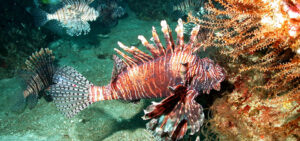
Invasive lionfish are generalist, opportunistic predators, meaning they are not picky when it comes to their food. NCCOS scientists contributed to two studies newly published in the journal Biological Invasions showing that while lionfish don’t mind if their seafood tastes like fish, crab or shrimp, the size of the lionfish matters when it comes to whether fish or shellfish make up most of their diet. Also, the species lionfish eat changes with their geographic location.
One of these newly published studies analyzed the diet composition of over 8,100 lionfish stomachs from 10 locations in the western Atlantic Ocean. Results indicated that lionfish consume at least 167 different vertebrate and invertebrate prey species across multiple trophic guilds and that lionfish diet varies considerably among locations. The researchers also developed the Modified Index of Relative Importance to assess prey importance when prey mass data are not available, allowing them to infer about lionfish feeding ecology in areas where their diet has not been observed.
The other study focused on the feeding ecology of lionfish in Biscayne National Park, located in southeast Florida, USA. Biscayne National Park consists of multiple marine habitats, including mangroves, seagrass beds, coral reefs, and limestone keys that support a diverse array of species resulting in multi-million dollar fishing and tourism industries. Researchers quantified the number of specific prey species consumed by lionfish using a lionfish bioenergetics model coupled with the diet assessment in Biscayne National Park. The model can also estimate the number of prey that do not fall victim to lionfish predation as a result of targeted removal events, such as “lionfish derbies.”
Given the large variability in lionfish diet composition among locations, these two studies highlight the importance of continued location-based diet assessments to better inform local management activities.
Project Partners: Biscayne National Park, Blue Ventures Conservation, College of Charleston, Florida Fish and Wildlife, Florida State University, National Park Service, North Carolina State University, Plymouth University, South Carolina Department of Natural Resources, University of Florida, University of Massachusetts, University of South Florida, University of the Virgin Islands.
Contact James.Morris@noaa.gov for more information.
